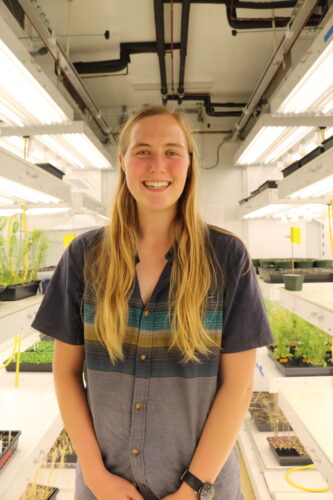Photo Courtesy of Liana Talpins.
Harper Lowrey (YC ’24) first became fascinated by the wide-ranging implications of science after reading a book with her mom called Lab Girl as a child. “My mom read it and said that she could never work in science, while I was like, ‘Ooh that sounds fun,’” Lowrey said. “[I find inspiration] when things get rough, but there are cool results that come out of the struggle.”
Lowrey, who grew up in Colorado, always enjoyed exploring the outdoors and first became interested in pursuing a career in research after participating in a summer camp at the University of Colorado Boulder. During the camp, she stayed at the university’s research station and had the opportunity to learn from mycologists—scientists who study fungi. “[I was] so enamored by the concept of being able to study the world, which I think was probably the start that led me into academic science,” Lowrey said.
Lowrey was determined to continue studying biology in college. When applying to Yale, she was selected for the Hahn Scholars program, which seeks to recruit high-achieving students with extensive STEM research experience. As a first-year, Lowrey joined the Gendron Lab, where she investigated how plant circadian clocks use post-translational regulation to control the amount of protein active in a system at one time.
Although conducting research could have been an intimidating experience, members of the Gendron Lab made sure that Lowrey felt like a valued member of the group. “I was immediately treated like somebody who had ideas that were important, which I think is a really great environment in science, instead of like, ‘You need to sit there and be quiet and learn from other people.’ I have really benefited from being a part of the team and working towards our common goal,” Lowrey said.
Lowrey’s research in the Gendron Lab is focused on understanding how the growth restrictor gene, CFH1, is controlled by a plant’s circadian clock. Circadian clocks allow plants to predict changes in their environments on a 24-hour cycle and are responsible for the regulation of a variety of functions essential for survival, such as growth and defense. In the absence of CFH1, plants develop very long hypocotyls, the first seedling stems that occur after germination. Lowrey’s research has helped uncover CFH1’s role in controlling hypocotyl growth in Arabidopsis thaliana, a common plant model species. A manuscript that includes Lowrey’s research has been submitted for peer review and will likely lead to further research regarding how CFH1 works in other plant species.
In addition to conducting research at Yale, Lowrey participated in molecular biology research on transgene silencing—the loss of gene expression transferred from one organism to another—at the Donald Danforth Plant Science Center in Missouri. In the summer after her junior year, she also conducted research at the Cold Spring Harbor Laboratory on argonaute proteins, which are integral in RNA interference. Both experiences provided her with the opportunity to meet other plant biologists and to contribute to postdoctoral research projects. “You learn a lot when you are new to a place—getting new techniques or doing different things—and I feel like it also helps increase my scientific confidence,” Lowrey said.
While Lowrey’s research is designed to increase knowledge of plant physiology and is not specifically linked with industry interests, she recognizes the complexities that arise when conducting plant biology research more closely tied to industry. “I do think a lot more thought needs to be about what products we are trying to produce—especially if we’re talking about agriculture and products that are going to the market. Just because something is cost-effective or we will make money from it is not the only reason to make that kind of thing,” Lowrey said.
In April, Lowrey’s commitment to research earned her the prestigious Goldwater Scholarship. She is now working to complete her major in Molecular, Cellular, and Developmental Biology, as well as certificates in French and Education Studies. After graduation, she plans to pursue a Ph.D. in plant molecular biology. As Lowrey continues to study science, she finds enjoyment in building a deeper understanding of the world and hopes to help others do the same by running her own lab and mentoring the next generation of scientists.
“Long term, my goal is academia,” Lowrey said. “I am really interested in thinking about what kinds of things are important in how we’re teaching and policies around teaching. It is important that college professors know how to teach […] in ways that are equitable and effective.”

